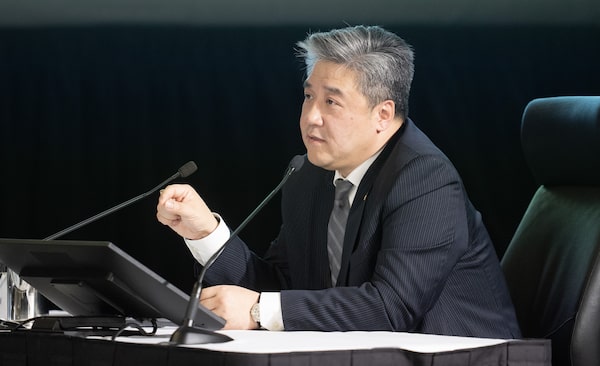
Han Dong appears as a witness at the Public Inquiry Into Foreign Interference in Federal Electoral Processes and Democratic Institutions on April 2 in Ottawa.Adrian Wyld/The Canadian Press
When Han Dong wanted to run for Parliament in Toronto, the first step was for him to win a Liberal nomination. And part of his campaign strategy was asking international students from China to vote for him.
There was a bus that brought international students to the Don Valley North nomination meeting in 2019. And, according to an intelligence summary filed with the Foreign Interference Commission, Chinese government officials made veiled threats to the students, implying their study permits would be in jeopardy if they didn’t support Mr. Dong.
Some intelligence suggested that a “known proxy agent” of Beijing might have given the students documents that indicated, falsely, that they lived in Don Valley North.
Mr. Dong has said he wasn’t involved in organizing the busload of students and didn’t know anything about the documents. But still, he has said he visited the students to ask for their votes.
The whole episode is unacceptable, on many levels. But let’s take a second look: Most of it, apart from the alleged use of false documents, wasn’t even against the rules.
Under Liberal Party of Canada rules, campaigning to foreign students as young as 14 was fine. If they actually lived in Don Valley North, they could vote for a candidate. They could be recruited by the busload.
Justin Trudeau’s Liberals should never have allowed it. Those loose eligibility requirements are a Liberal Party policy that isn’t shared by other parties – although most allow ballots to be cast by people who wouldn’t legally be allowed to vote in an election.
All of it points to a wider problem.
Nomination contests aren’t regulated parts of Canadian elections. They follow the clubhouse rules of political parties.
In the age of foreign interference, they are a weak link in the Canadian democratic system.
Nomination races matter because the candidates can become members of Parliament. In many places, the nominee of the most popular party is a shoo-in.
And yet, nominations don’t have public oversight.
If you haven’t been to a nomination meeting for a major political party, you might not know that they are about as democratic as a barroom brawl, in the sense that whoever brings the most people into the room that night is going to win.
The contest is about signing up people as party members and getting them to a meeting. Sometimes, that means thousands. Often, it is only hundreds. In that context, a busload of foreign students can easily make up the winning margin.
The reason most parties open up voting to some people who aren’t eligible to vote in elections is because their goal is to recruit. They want young people and new Canadians who aren’t yet citizens to get involved. It’s good for the club.
Parties – that is, party HQs – regularly rig nomination battles, or influence them through various means, to aid the candidates they want. They can disqualify candidates. Or better still, they can suddenly announce timetables that don’t give the non-favoured candidates much time to sign up members.
In February, Pierre Poilievre’s Conservatives called a nomination race in the riding of Richmond Hill, but set the cut-off for signing up eligible voters for two days later. In 2014, the Liberals disqualified long-time party member Christine Innes from running in Trinity-Spadina, after she declined to pledge that she would not contest the nomination the following year in a redistricted riding that was earmarked for Chrystia Freeland. There are many, many more cases.
“Nominations are the Wild West. In every single party,” Jaskaran Sandhu, of the Sikh Coalition, said in an interview. Mr. Sandhu, who was part of a panel of representatives of diaspora groups at the Foreign Interference Commission, argued that nomination contests and party leadership races are especially vulnerable to political interference.
Mr. Sandhu said he believes that Indian diplomats have pressed political parties to bar some Sikh candidates. And because nomination races are so rife with arbitrary, mysterious decisions that aren’t subject to public scrutiny, they are vulnerable to such pressure.
All this, apart from the financing of nomination contestants, is mostly unregulated – even though it is a key step in the election process.
It could be done differently. Voters in the U.S. choose to register as partisans and are then eligible to vote in local party races. There are rules set by law.
The big parties don’t want those changes. Mr. Trudeau and Mr. Poilievre won’t want to give up control. But it is a weak spot in Canadian democracy that shouldn’t be left to the whims of political parties any longer.
 Campbell Clark
Campbell Clark